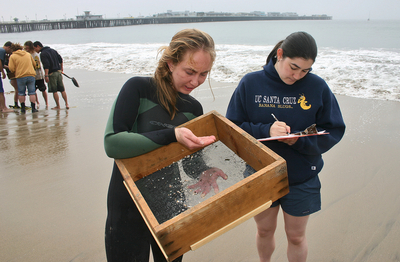Fostering diversity, equity, and inclusion in ocean sciences
“You’re a natural!”
When a professor said this during an undergraduate geology field trip, Christina Ravelo started realizing—for the first time—that she really could become a scientist.
Ravelo says she had never heard words like that from a professor. And it made her start believing in herself: “Oh wow, I can actually do this, I can be this!”

But she also recalls how difficult it was for her to identify as a scientist and the barriers she faced as a female and person of color. Now an ocean sciences professor and associate dean of diversity, equity, and inclusion in the division of physical and biological sciences at UC Santa Cruz, Ravelo says she has watched many people during her 30 year career struggle with their sense of belonging. She explains that it can be a tough road for students from diverse or disadvantaged backgrounds to come into and remain in academia—to the detriment of science.
“It’s well studied that diverse perspectives promote science innovation,” Ravelo says. “At the same time, diversity hasn’t been increasing much in the geosciences over the past decades. It’s because of these stark facts—that there is so little diversity in the ocean and marine sciences and geosciences in general—that we have to do everything we can to promote diversity. This is true not only in the work that I do professionally but also in the actions that I take as an individual.”
She and her husband, Roberto Gwiazda, established the Oceans Sciences DEI and Anti-Racism fund as a way of raising awareness about diversity in the geosciences and helping graduate students from disadvantaged backgrounds succeed in the field. Ravelo hopes the fund will bring more visibility to and recognition of the barriers that people face in order to be successful in the ocean and marine sciences.
The Oceans Sciences DEI and Anti-Racism fund will be used to promote diversity by supporting ocean sciences Ph.D. students who have experienced situations or conditions that have adversely impacted their advancement in their field of study—such as belonging to a group that is under-represented in the field, having a disability, or being a first-generation college student. Ravelo says the fund is meant to help students with personal expenses that aren’t supported by the department or program—for example, a boost for those who need to buy a laptop, travel home, or to help cover the high cost of living in Santa Cruz.
“A lot of minoritized students come from financially disadvantaged backgrounds,” Ravelo says. “There are a lot of students, especially first generation college students who don’t have a safety net. There are even students who send money home to help their families. The fund was one way we felt that we as individuals could help with this problem.”
The ocean sciences division will promote the fund among its graduate students. Ravelo says she hopes that just knowing it exists will give grad students from underrepresented backgrounds encouragement and belief in themselves.
“Once you’re in the graduate program,” Ravelo says, “you’ve already proven that you’re qualified to be here. This fund is based on financial need, to give them an extra boost to succeed. It won’t be tied to any promises to do research, and it will not be a burden to apply for funding. It’s meant to alleviate anxiety and burdens—if you need it, you need it.”
Ravelo hopes the Oceans Sciences DEI and Anti-Racism fund will continue to grow.
“Actions are needed,” she says, “I hope people are inspired to do something. There’s a lot of discussion and talk about these issues, but many people don’t know what they can do to help. If you believe in the issues and the cause, the Ocean Sciences DEI and Anti-Racism fund is an easy way to help. We hope we have gotten the ball rolling and it will gain momentum.”